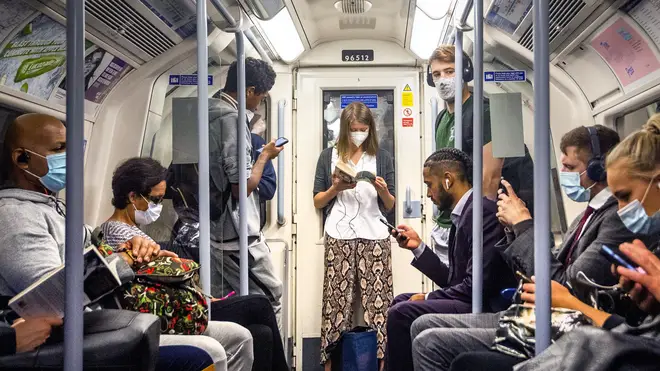
Nick Abbot 10pm - 1am
14 July 2021, 00:01 | Updated: 14 July 2021, 13:05

Sadiq Khan has asked Transport for London to keep face masks compulsory on public transport after July 19.
It comes after Boris Johnson announced on Monday that there would no longer be a legal requirement to wear masks in any setting after that date.
The Prime Minister instead urged people to exercise "personal responsibility" in continuing to wear them in "crowded and enclosed spaces".
Reports say TfL is set to accept Mr Khan's request - meaning commuters on the Tube, bus and rail services will not be able to dispense with coverings yet.
READ MORE: Nicola Sturgeon eases Scotland lockdown to Level 0 - but face masks remain mandatory
READ MORE: 'Irresponsible': Senior doctors condemn PM's 19 July lockdown easing
The mayor said he was "not prepared" to put transport users in the capital "at risk".
The requirement would mean passengers on all TfL services, which also include tram, Docklands Light Railway (DLR) and Overground, would need to continue to wear a face covering in stations and for the duration of their journey unless they are exempt.
Under the terms of use, enforcement officers would be able to deny access or eject passengers found to be non-compliant.
Mr Khan has also asked TfL to put measures in place to help ensure the continued use of masks in taxis and private hire vehicles by both drivers and passengers unless they are exempt.

Ben Kentish asks PM why masks are becoming optional
"I've repeatedly made clear that the simplest and safest option would have been for the Government to retain the national requirement for face coverings on public transport," he said.
"I'm not prepared to stand by and put Londoners, and our city's recovery, at risk.
"This is why, after careful consideration, I have decided to ask TfL to retain the requirement for passengers to wear a face covering on all TfL services when the national regulations change.
"By keeping face masks mandatory we will give Londoners and visitors the reassurance and confidence to make the most of what our city has to offer, while also protecting our heroic transport workers and those who may be vulnerable and rely on the network to get around our city."
Officials said TfL enforcement officers patrolling London's transport network, under the conditions of carriage requirement, will be able to refuse entry to people not wearing masks and who are not exempt, and would also be able to ask people to leave services for failure to comply with the requirement.

Excess deaths on PM's head as consequence of lifting restrictions
TfL said over the past year almost 212,000 people have been stopped by enforcement officers from getting on the network until they put on a face covering.
Almost 14,000 people have been prevented from boarding and around 3,200 were ejected from services.
In total, 4,300 fixed penalty notices have been issued since the mask wearing rules came in last year, it said.
Andy Byford, London's transport commissioner, said: "I urge everyone to continue to follow the requirements so that we can continue to build confidence, and get back to the many wonderful things about London that we have missed during the pandemic."
Aslef, the train drivers' union, welcomed the move by the Mayor of London but pointed out that, without legal enforcement, there will still be potential for disputes and disruption.

Scrapping restrictions 'now or never' is a 'false dichotomy'
Mick Lynch, general secretary of the Rail, Maritime and Transport (RMT) union, called for "consistency" across local and national transport services.
"This is welcome from the London Mayor and is consistent with the position currently adopted in Scotland, Wales and on Eurostar," he said
"However, we now have the ludicrous position where a passenger travelling through London will have different rules on the tube and the main line services."
A Government spokeswoman said: "The guidance is clear that people are expected and recommended to wear a mask when they come into contact with people they don't normally meet in enclosed and crowded spaces.
"It is open to transport operators to decide if they want to take further measures."
Tube ridership is at about 40-45% of pre-pandemic levels and bus ridership at around 60-65%, according to TfL data.